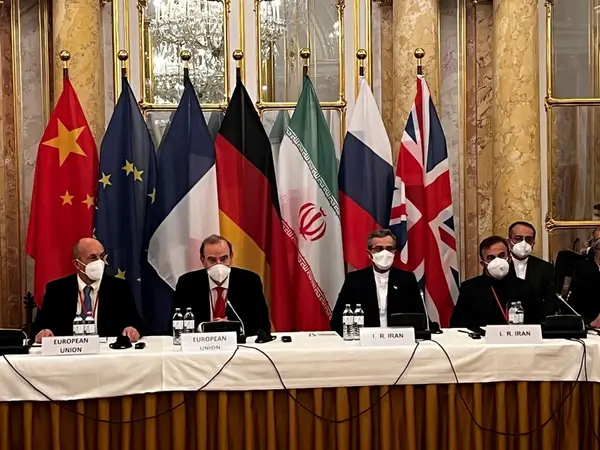Hardliners in Iran have been trumpeting pessimistic ideas about the outcome of nuclear negotiations in Vienna all Friday as the first round of talks wrapped up.
Friday Prayer Imams took the lead in putting forward excessive demands such as calling for lifting all sanctions against Iran before starting to discuss the United States' return to the JCPOA framework.
On Thursday, Tehran news outlets quoted hardliners as claiming that the Iranian delegation has humiliated the US diplomats by not allowing them to join the talks and forcing them to listen to other negotiators from an adjacent room.
IRGC-linked Fars news agency carried comments by hardliner commentator Mohammad Marandi on pro-Iran Al-Mayadeen TV in Lebanon. Marandi is accompanying the Iranian delegation as an "adviser" who has been seen interpreting for the delegation as most of its members do not speak English.
Fars quoted Marandi as saying that Iran has a plan B in case the United States refuses to return to the 2015 nuclear deal (JCPOA). The plan, Marandi said, includes continuing the nuclear program and strengthening Iran's ties with Asian countries.
The only Asian country that continues any significant trade relations with Iran after the US withdrawal from the JCPOA in 2018 is China with whom Iran has signed a 25-year agreement for cooperation.
Marandi said that Iran is waiting for JCPOA partners to comment on the two draft documents Tehran put forward on Thursday. No official response has been observed on the part of the European trio and the United States and Russia and China to the drafts. However, French President Emmanuel Macron has said that this round of negotiations appears to have remained inconclusive and made no progress.
Thursday evening Russian negotiator Mikhail Ulyanov denied reports that the negotiations have failed to reach any positive results.
Meanwhile, Marandi told Al-Mayadin that Iran has yet a third draft that it has not presented to the JCPOA member states. He added that based on these drafts the US and European sides cannot accuse Iran of having excessive demands. Elsewhere in the interview with Al-Mayadin, Marandi acknowledged that "The European side has expressed its dissatisfaction with the drafts."
According to Reuters, Senior European trio (British, French and German) diplomats taking part in the talks expressed "disappointment and concern" Friday at Tehran's proposed alterations to a text that had been agreed on in previous rounds. "Major changes (have been) demanded (by Iran)," the officials said in a statement, adding that some were incompatible with the JCPOA, adding that it is "unclear how these new gaps can be closed in a realistic timeframe based on Iranian drafts," they said
Some European negotiators have reportedly said that what is included in Iran’s documents is nothing more than what had been agreed but not finalized five months ago. They added that Iran has still not answered some of the questions pending since the end of the first six rounds of talks in June.
Marandi wrote in a tweet: "The US/EU can't have their cake & eat it too. They can't expect the Islamic Republic of Iran to go back to 2015, yet they keep parts of their post-JCPOA sanctions regime intact. The new administration has made it clear that the barbaric Western maximum pressure sanctions must go."
Responding to Marandi's comment, Iranian-American analyst Ali Vaez wrote in a December 2 tweet: "This is why a diplomatic deadlock is the likeliest outcome in Vienna. Iran can’t expect a nuclear deal to unshackle it from sanctions aimed at non-nuclear policies. That is the definition of having your cake and eating it too."
